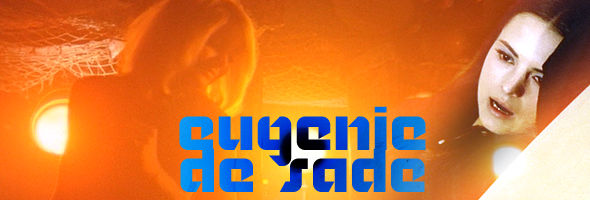

Color, 1970, 91m. / Directed by Jess Franco / Starring Soledad Miranda, Paul Muller, Jess Franco, Alice Arno / Blue Underground (US R0 NTSC) / WS (1.66:1) (16:9), Wild East (US R1 NTSC), Oracle (UK R0 PAL), X-Rated (Germany R0 PAL) / WS (1.66:1)
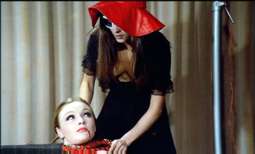 plays a bit like an incestuous take on The Honeymoon Killers. Miranda stars as the title character, a young woman first seen in a dreamy snuff film seducing a woman who winds up murdered by an offscreen assailant. Turns out the culprit is her stepfather, a debauched writer named Albert (Muller), who has been gradually indoctrinating her into a lifestyle of nightclubs, models, seduction, and murder, with the two carrying on a sadistic affair linking all their victims. Unfortunately one male victim threatens to come between their unholy alliance, with a knife blade ultimately determining the fate of all involved.
plays a bit like an incestuous take on The Honeymoon Killers. Miranda stars as the title character, a young woman first seen in a dreamy snuff film seducing a woman who winds up murdered by an offscreen assailant. Turns out the culprit is her stepfather, a debauched writer named Albert (Muller), who has been gradually indoctrinating her into a lifestyle of nightclubs, models, seduction, and murder, with the two carrying on a sadistic affair linking all their victims. Unfortunately one male victim threatens to come between their unholy alliance, with a knife blade ultimately determining the fate of all involved.
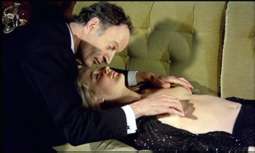 well.) Muller matches her throughout as the multilayered older man who has been controlled his beautiful charge's destiny since doing away with her parents, and the snowy settings add a unique atmospheric edge different from the usual Franco beachscapes.
well.) Muller matches her throughout as the multilayered older man who has been controlled his beautiful charge's destiny since doing away with her parents, and the snowy settings add a unique atmospheric edge different from the usual Franco beachscapes.
 Fortunately Blue Underground's much-needed release is culled from the original negative and easily blows other versions out of the water; the gasp-inducing clarity of the opening images carries through the entire feature, with beautiful detail and color rendition creating a hallucinatory treat rivalling the finest Franco digital releases to date. You really couldn't imagine this film could ever look so good. The disc also contains both audio options, but only masochists would choose to wade through that muddy, poorly-voiced English track again. This transfer also bears a title card reading Eugenia, which carries over to the theatrical trailer which is a bit differnet from past releases (and confusingly scored with Bruno Nicolai's "De Sade 70" cue from Eugenie... The Story of Her Journey into Perversion). The only other extra is "Franco De Sade," a 20-minute featurette with the typically entertaining and heavily-accented director talking about the film, with a particular focus on his paternal relationship with Miranda. For some reason the hilarity of his interviews has a converse relationship with the quality of his films; since this is a great movie, it's more sedate and touching than, say, Cannibals, which is a riot from start to finish. A sterling release all around; however, it's worth nothing that while the European DVD releases are now rendered completely obsolete, completists might want to hang on to their Wild East DVD since it contains some tantalizing fragments from unfinished Franco Eurocine projects which have failed to materialize elsewhere.
Fortunately Blue Underground's much-needed release is culled from the original negative and easily blows other versions out of the water; the gasp-inducing clarity of the opening images carries through the entire feature, with beautiful detail and color rendition creating a hallucinatory treat rivalling the finest Franco digital releases to date. You really couldn't imagine this film could ever look so good. The disc also contains both audio options, but only masochists would choose to wade through that muddy, poorly-voiced English track again. This transfer also bears a title card reading Eugenia, which carries over to the theatrical trailer which is a bit differnet from past releases (and confusingly scored with Bruno Nicolai's "De Sade 70" cue from Eugenie... The Story of Her Journey into Perversion). The only other extra is "Franco De Sade," a 20-minute featurette with the typically entertaining and heavily-accented director talking about the film, with a particular focus on his paternal relationship with Miranda. For some reason the hilarity of his interviews has a converse relationship with the quality of his films; since this is a great movie, it's more sedate and touching than, say, Cannibals, which is a riot from start to finish. A sterling release all around; however, it's worth nothing that while the European DVD releases are now rendered completely obsolete, completists might want to hang on to their Wild East DVD since it contains some tantalizing fragments from unfinished Franco Eurocine projects which have failed to materialize elsewhere.
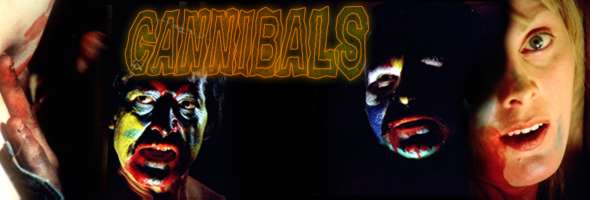
Color, 1980, 90m. / Directed by Jess Franco / Starring Al Cliver, Sabrina Siani, Lina Romay, Shirley Knight, Robert Foster, Anouchka, Olivier Mathot / Blue Underground (US R0 NTSC) / WS (1.66:1) (16:9)
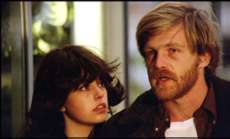 between the far more inflammatory Cannibal Holocaust and Cannibal Ferox. Here we have none of the animal violence (thank goodness) or narrative and moral complexity (alas), with Franco and regular Eurocine producer Daniel Lesoeur instead turning out a bloody and hysterically cheap homage to great white hunter epics with some flesh-eating action thrown in to spice things up, albeit in very, very, very slow motion.
between the far more inflammatory Cannibal Holocaust and Cannibal Ferox. Here we have none of the animal violence (thank goodness) or narrative and moral complexity (alas), with Franco and regular Eurocine producer Daniel Lesoeur instead turning out a bloody and hysterically cheap homage to great white hunter epics with some flesh-eating action thrown in to spice things up, albeit in very, very, very slow motion.
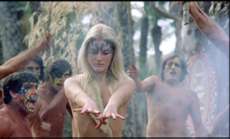 A jaw-dropping feast of wooden acting, baffling editing, atrocious dubbing, and unbelievably protracted cannibalism scenes with painted extras gnawing on raw steak, Cannibals is nevertheless a lot of fun if you're looking for a fast-paced, goofy distraction. It's nowhere remotely as offensive as most of its ilk, and Franco keeps the laughs coming fast and furious with the least convincing "exotic" natives ever committed to film. Never one of the most charismatic actors, Cliver seems to be staring off into space for most of the film but does finally muster up a little energy for the unforgettable climax, which finds him battling the tribe chief in a creek while soaking wet in a T-shirt and trying to hide his "missing" arm underneath a fake stump. Unfortunately Franco seems to run out of inspiration at the same time, delivering a story resolution that feels more like an indifferent shrug. Oddly enough, there's really no sexual content at all in the film (not even from Lina!) unless you count the casual displays of Ms. Siani's body. Meanwhile Roberto Pregadio serves up an inappropriate but amusing music score that could only have been composed in 1980. Low-rent bliss all the way. For some reason the opening credits attribute the film to mondo kingpin Franco Prosperi, but don't believe it.
A jaw-dropping feast of wooden acting, baffling editing, atrocious dubbing, and unbelievably protracted cannibalism scenes with painted extras gnawing on raw steak, Cannibals is nevertheless a lot of fun if you're looking for a fast-paced, goofy distraction. It's nowhere remotely as offensive as most of its ilk, and Franco keeps the laughs coming fast and furious with the least convincing "exotic" natives ever committed to film. Never one of the most charismatic actors, Cliver seems to be staring off into space for most of the film but does finally muster up a little energy for the unforgettable climax, which finds him battling the tribe chief in a creek while soaking wet in a T-shirt and trying to hide his "missing" arm underneath a fake stump. Unfortunately Franco seems to run out of inspiration at the same time, delivering a story resolution that feels more like an indifferent shrug. Oddly enough, there's really no sexual content at all in the film (not even from Lina!) unless you count the casual displays of Ms. Siani's body. Meanwhile Roberto Pregadio serves up an inappropriate but amusing music score that could only have been composed in 1980. Low-rent bliss all the way. For some reason the opening credits attribute the film to mondo kingpin Franco Prosperi, but don't believe it.
 Though some completists may have picked up the bare bones Region 2 release, most people had to endure wretched-looking video transfers of this title for years. Blue Underground's release looks about as good as this film possibly could, given that it appears to have been shot on at least four different types of film stock. Some scenes are wonderfully colorful and razor-sharp, while other (mainly at the end) look blearly and bleached out, a deficiency present in many Eurocine titles from the period. The presentation itself is terrific, however. Since at least four different languages must have been spoken on-set, the English dub track here is about as genuine as any out there but is still a complete mess, never coming close to matching anyone's lip movements. It's all strangely appropriate, however. The best aspect of the disc is easily the new 20-minute video interview, "Franco Holocaust," in which the thick-accented director speaks in English (with much-needed optional subtitles) about his disdain for the Italian cannibal fad, working with Daniel Leseour, his admiration for Cliver's work ethic, and best and most protracted of all, his attitudes about Sabrina Siani ("One of the most stupid people I have ever worked with"), including a priceless demonstration of her inability to look in the proper direction during filming. Oh, and the cannibals were all played by a bunch of Spanish gypsies they rounded up near the set. A French trailer (under the Mondo Cannibal title) is also included.
Though some completists may have picked up the bare bones Region 2 release, most people had to endure wretched-looking video transfers of this title for years. Blue Underground's release looks about as good as this film possibly could, given that it appears to have been shot on at least four different types of film stock. Some scenes are wonderfully colorful and razor-sharp, while other (mainly at the end) look blearly and bleached out, a deficiency present in many Eurocine titles from the period. The presentation itself is terrific, however. Since at least four different languages must have been spoken on-set, the English dub track here is about as genuine as any out there but is still a complete mess, never coming close to matching anyone's lip movements. It's all strangely appropriate, however. The best aspect of the disc is easily the new 20-minute video interview, "Franco Holocaust," in which the thick-accented director speaks in English (with much-needed optional subtitles) about his disdain for the Italian cannibal fad, working with Daniel Leseour, his admiration for Cliver's work ethic, and best and most protracted of all, his attitudes about Sabrina Siani ("One of the most stupid people I have ever worked with"), including a priceless demonstration of her inability to look in the proper direction during filming. Oh, and the cannibals were all played by a bunch of Spanish gypsies they rounded up near the set. A French trailer (under the Mondo Cannibal title) is also included.
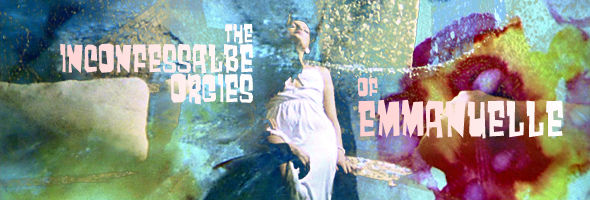
Color, 1982, 86m. / Directed by Jess Franco / Starring Victoria Adams, Antonio Robello, Ina Balin, Carmen Carrion / Severin (US R0 NTSC) / WS (2.35:1) (16:9)
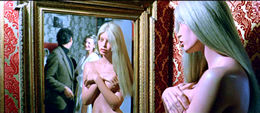 director's other output during his busy return to Spain in the early '80s. Once again the filmmaker's trademark obsessions with seaside locales and cubist decor are in abundance here to offset the frequent writhing naked bodies, though the expected perverse touches are kept to a minimum here in favor of a plot straight out of your average cable softcore offering.
director's other output during his busy return to Spain in the early '80s. Once again the filmmaker's trademark obsessions with seaside locales and cubist decor are in abundance here to offset the frequent writhing naked bodies, though the expected perverse touches are kept to a minimum here in favor of a plot straight out of your average cable softcore offering.
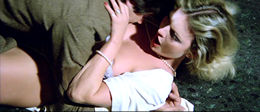 Occasional Franco collaborator "Victoria Adams," aka French TV personality Muriel Montossé, stars as the title character, who's married to a decidedly piggish macho husband, Tony (Robello), whose past lover is staying nearby. Though they can't keep their hands off each other (even in a wax museum populated with disturbing replicas of Humphrey Bogart and Liza Minnelli in full Cabaret gear), they don't seem too disturbed by the idea of dallying around with other vacationers at their hotel resort. Unfortunately the freshly-plucked wife gets a little too out of control, first having a little lesbian action with a burlesque dancer and then initiating a series of extramarital encounters which could destroy the fabric of her marriage forever.
Occasional Franco collaborator "Victoria Adams," aka French TV personality Muriel Montossé, stars as the title character, who's married to a decidedly piggish macho husband, Tony (Robello), whose past lover is staying nearby. Though they can't keep their hands off each other (even in a wax museum populated with disturbing replicas of Humphrey Bogart and Liza Minnelli in full Cabaret gear), they don't seem too disturbed by the idea of dallying around with other vacationers at their hotel resort. Unfortunately the freshly-plucked wife gets a little too out of control, first having a little lesbian action with a burlesque dancer and then initiating a series of extramarital encounters which could destroy the fabric of her marriage forever.
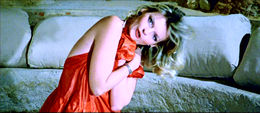 and the nonlinear device of unfolding the story as a series of recollections through the male lead during an afternoon stroll is certainly an interesting and melancholic one.
and the nonlinear device of unfolding the story as a series of recollections through the male lead during an afternoon stroll is certainly an interesting and melancholic one.

Color, 1999, 86m. / Directed by Jess Franco / Starring Lina Romay, Christie Levin, Paul Lapidus, Anna Stern / Sub Rosa (US R1 NTSC)
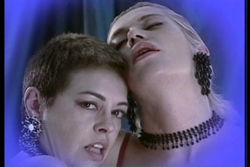 throughout his career, Franco didn't return to the idea full force until his shot-on-video days with One Shot Productions courtesy of Red Silk, a much more explicit and technically dubious outing. Lina Romay is in typically exhibitionistic form as Gina, one half of a detective service/escort agency along with blonde Tina (Christie Levin). The bulk of the film involves the girls lounging around naked in bed and around a hotel where they occasionally get roped into performing potentially criminal activity, whether with a chubby naked photographer or a shady diplomat. They also pull out a gun now and then and race around Scooby Doo style for no particular reason.
throughout his career, Franco didn't return to the idea full force until his shot-on-video days with One Shot Productions courtesy of Red Silk, a much more explicit and technically dubious outing. Lina Romay is in typically exhibitionistic form as Gina, one half of a detective service/escort agency along with blonde Tina (Christie Levin). The bulk of the film involves the girls lounging around naked in bed and around a hotel where they occasionally get roped into performing potentially criminal activity, whether with a chubby naked photographer or a shady diplomat. They also pull out a gun now and then and race around Scooby Doo style for no particular reason.
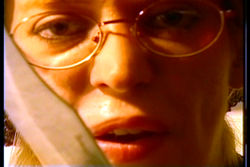 If that synopsis sounds a bit vague and choppy, that's nothing compared to the actual experience of sitting through Red Silk. Franco's jokey, free-form style is still in evidence here, but his efforts are completely sabotaged by the decision to shoot this film in Spanish - and then dub the whole thing over wildly out of synch in English, but spoken entirely with thick, unintelligible Spanish accents! Now instead of the barely audible English from his other video projects, we now get to enjoy a shoddy, ear-shredding dub job with Lina (who's always difficult to understand anyway) trying to dub herself over in a language she barely speaks. If you can get over this hurdle, the film has its moments; the aforementioned photographer vignette is an amusing Francoesque diversion, and though the film barely seems to be striving for a plot (exactly how the girls earn their money is never quite made clear), it
If that synopsis sounds a bit vague and choppy, that's nothing compared to the actual experience of sitting through Red Silk. Franco's jokey, free-form style is still in evidence here, but his efforts are completely sabotaged by the decision to shoot this film in Spanish - and then dub the whole thing over wildly out of synch in English, but spoken entirely with thick, unintelligible Spanish accents! Now instead of the barely audible English from his other video projects, we now get to enjoy a shoddy, ear-shredding dub job with Lina (who's always difficult to understand anyway) trying to dub herself over in a language she barely speaks. If you can get over this hurdle, the film has its moments; the aforementioned photographer vignette is an amusing Francoesque diversion, and though the film barely seems to be striving for a plot (exactly how the girls earn their money is never quite made clear), it 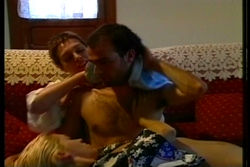 throws enough weirdness and cellulite-rich nudity to keep fans of weird cinema glued to the TV in rapt fascination (or horror). And make no mistake about it, the skin quotient here is extremely high as both of the female leads leave no centimeter of their bodies to the imagination; consider yourself warned.
throws enough weirdness and cellulite-rich nudity to keep fans of weird cinema glued to the TV in rapt fascination (or horror). And make no mistake about it, the skin quotient here is extremely high as both of the female leads leave no centimeter of their bodies to the imagination; consider yourself warned.

Color, 1968, 86m. / Directed by Jess Franco / Starring James Darren, Maria Rohm, Barbara McNair, Klaus Kinski, Margaret Lee, Dennis Price / Blue Underground (US R1 NTSC) / WS (1.85:1) (16:9)
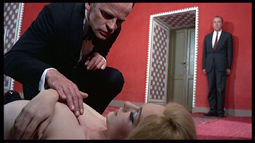 time earlier, lying in the surf. In flashbacks her death is relived at the hands of three decadent sadists: photographer Olga (Lee), aging Percival (Price), and cruel Ahmed (Kinski). Soon Wanda - or someone who looks very much like her - reappears and begins an affair with Jimmy, who is also seeing nightclub singer Rita (McNair). When not in bed with Jimmy, Wanda silently hunts down her murderers one by one, seducing and then killing them. However, as Jimmy soon discovers, Wanda's revenge is just one small part of the supernatural world into which he has been drawn.
time earlier, lying in the surf. In flashbacks her death is relived at the hands of three decadent sadists: photographer Olga (Lee), aging Percival (Price), and cruel Ahmed (Kinski). Soon Wanda - or someone who looks very much like her - reappears and begins an affair with Jimmy, who is also seeing nightclub singer Rita (McNair). When not in bed with Jimmy, Wanda silently hunts down her murderers one by one, seducing and then killing them. However, as Jimmy soon discovers, Wanda's revenge is just one small part of the supernatural world into which he has been drawn.
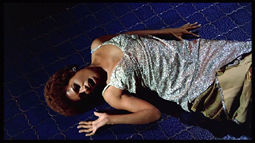 anticipating the delirious odes to Soledad Miranda and Lina Romay to come in the following decade, often repeating the basic structure of this film with various new grace notes thrown in for variety.
anticipating the delirious odes to Soledad Miranda and Lina Romay to come in the following decade, often repeating the basic structure of this film with various new grace notes thrown in for variety.
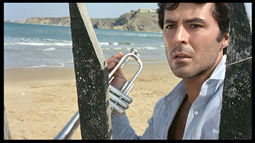 in Furs works best when you tuck away any rigid notions of logic and just go with the flow. For those willing to submit, it's one hell of a ride.
in Furs works best when you tuck away any rigid notions of logic and just go with the flow. For those willing to submit, it's one hell of a ride.
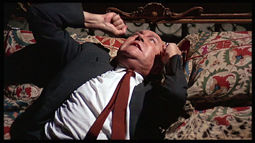 muddy colors have been replaced by a wonderfully colorful and crystal clear appearance, with stock shots and some ragged second unit work a bit more apparent than before. (That's not dirt on the print during some of those abstract beach shots; it was always there from the beginning.) The film was shot in English with most of the performers looping their own dialogue, so the audio doesn't suffer much at all. (Too bad we couldn't get an isolated music track as the soundtrack has tragically never been available, but you can't have everything!)
muddy colors have been replaced by a wonderfully colorful and crystal clear appearance, with stock shots and some ragged second unit work a bit more apparent than before. (That's not dirt on the print during some of those abstract beach shots; it was always there from the beginning.) The film was shot in English with most of the performers looping their own dialogue, so the audio doesn't suffer much at all. (Too bad we couldn't get an isolated music track as the soundtrack has tragically never been available, but you can't have everything!)
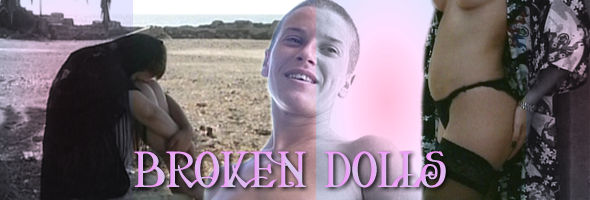
Color, 1999, 83m. / Directed by Jess Franco / Starring Paul Lapidus, Lina Romay / Sub Rosa (US R1 NTSC)
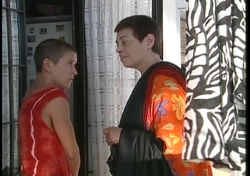 earlier films. The plot (to use the term generously) revolves around the increasingly insane family of Don Martin (Lapidus), an aging, bearded actor who keeps his wife and daughters on an island with the promise of buried treasure. The girls have pretty much lost any inhibtions: bald Gina (Christie Levin) constantly wanders the beach nude apart from a knife belt (shades of Dr. No and Franco's The Perverse Countess), while slutty blonde Beatriz (Mavi Tienda) lounges around in skimpy lingerie to seduce local guitar plucker Herbie (Ezequiel Cohen) who deadpans, "I don't get horny from that kind of girl." Apparently Gina is more to Herbie's taste, and he shows her a treasure chest he's discovered containing gold coins. Meanwhile the patriarch's sanity begins to crumble as he suspects his wife of infidelity, leading to a bloody finale straight out of Beyond the Valley of the Dolls that finds him running amuck with a sword while dressed as a pirate.
earlier films. The plot (to use the term generously) revolves around the increasingly insane family of Don Martin (Lapidus), an aging, bearded actor who keeps his wife and daughters on an island with the promise of buried treasure. The girls have pretty much lost any inhibtions: bald Gina (Christie Levin) constantly wanders the beach nude apart from a knife belt (shades of Dr. No and Franco's The Perverse Countess), while slutty blonde Beatriz (Mavi Tienda) lounges around in skimpy lingerie to seduce local guitar plucker Herbie (Ezequiel Cohen) who deadpans, "I don't get horny from that kind of girl." Apparently Gina is more to Herbie's taste, and he shows her a treasure chest he's discovered containing gold coins. Meanwhile the patriarch's sanity begins to crumble as he suspects his wife of infidelity, leading to a bloody finale straight out of Beyond the Valley of the Dolls that finds him running amuck with a sword while dressed as a pirate.
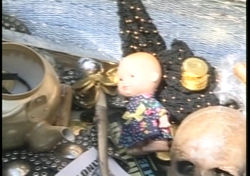 by Franco standards, Broken Dolls obviously suffers from shot-on-video limitations but sports some attractive island locations. Franco's beloved zoom lens is used surprisingly well here, such as the poetic opening sequence which finds traumatized witness Tona (Romay) gazing into the seascape dotted with circling oil tankers coming to decimate the island while a broken doll wafts in a nearby pond. The sexual content is fairly strong at times, but this isn't anywhere close to porn.
by Franco standards, Broken Dolls obviously suffers from shot-on-video limitations but sports some attractive island locations. Franco's beloved zoom lens is used surprisingly well here, such as the poetic opening sequence which finds traumatized witness Tona (Romay) gazing into the seascape dotted with circling oil tankers coming to decimate the island while a broken doll wafts in a nearby pond. The sexual content is fairly strong at times, but this isn't anywhere close to porn.
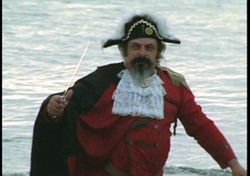 Franco to spin out another of his fantasias based on the Marquis De Sade. Eugenie this ain't, though Romay fans will be amused to see her as the main focus of attention performing a number of S&M acts while a female narrator reads passages from the much-maligned marquis. Whips, endless crotch and butt shots, bewildering snippets from other One Shot films including a bit with Rachel Sheppard swiped from Vampire Blues, and a bearded guy (Cohen again) tortured at knifepoint by Romay while strung up nude by the wrists. Perhaps it's all supposed to mean something, or perhaps not; in any case, Franco completists will have quite a time sorting it all out.
Franco to spin out another of his fantasias based on the Marquis De Sade. Eugenie this ain't, though Romay fans will be amused to see her as the main focus of attention performing a number of S&M acts while a female narrator reads passages from the much-maligned marquis. Whips, endless crotch and butt shots, bewildering snippets from other One Shot films including a bit with Rachel Sheppard swiped from Vampire Blues, and a bearded guy (Cohen again) tortured at knifepoint by Romay while strung up nude by the wrists. Perhaps it's all supposed to mean something, or perhaps not; in any case, Franco completists will have quite a time sorting it all out.

Color, 2001, 94m. / Directed by Jess Franco / Starring Lina Romay, Samantha Olsen / Sub Rosa (US R1 NTSC) / DD2.0
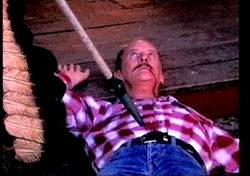 hybrid: a psychedelic sex vampire western! Once again shot on video, this odd entry in his ongoing "Irina" cycle is filmed with a bit more style than one might expect and blessed with a real western town set on which to paint his obsessive visions, though the results are still as uneven and frustrating in the end as one might expect.
hybrid: a psychedelic sex vampire western! Once again shot on video, this odd entry in his ongoing "Irina" cycle is filmed with a bit more style than one might expect and blessed with a real western town set on which to paint his obsessive visions, though the results are still as uneven and frustrating in the end as one might expect.
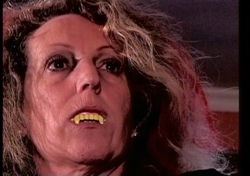 looking - silences him and offers Alice a high-priced room for the night. While sleeping, Irina is tormented by a vision of two naked vampire women in bright red fright wigs who rub all over each other, lick up shaving cream, and shave each other's crotches until they bleed. Seriously. Upon awakening, Alice goes downstairs to find Spencer skewered beneath a wooden Indian and finds herself unable to leave the town. Resigned to staying, she pumps the residents for information and writes profundities on her laptap: "The last fews days I have spent in this country are the most surrealistic of my life. The most nearby town, Shit City." Finally after countless visions of disappearing vampire ladies wafting up and down staircases, she finally figures out that she's the target of Countess Irina (Olsen), who wants to initiate her into the vampire fold.
looking - silences him and offers Alice a high-priced room for the night. While sleeping, Irina is tormented by a vision of two naked vampire women in bright red fright wigs who rub all over each other, lick up shaving cream, and shave each other's crotches until they bleed. Seriously. Upon awakening, Alice goes downstairs to find Spencer skewered beneath a wooden Indian and finds herself unable to leave the town. Resigned to staying, she pumps the residents for information and writes profundities on her laptap: "The last fews days I have spent in this country are the most surrealistic of my life. The most nearby town, Shit City." Finally after countless visions of disappearing vampire ladies wafting up and down staircases, she finally figures out that she's the target of Countess Irina (Olsen), who wants to initiate her into the vampire fold.
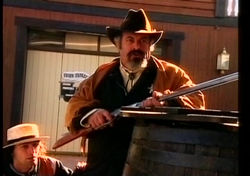 Utterly odd, Vampire Junction is another of Franco's languid, dreamlike fusions of sex and violence where reality and hallucinations overlap. The apocalyptic finale (or at least as apocalyptic as one can get shooting in a hotel room) is typical of his more recent output for One Shoot Productions, particularly the similar Incubus. Much of the dialogue is completely unintelligible thanks to a combination of thick accents and bizarre studio looping, with Romay's lines patched together from what sounds like at least three different recording sessions. Still, it's a Franco movie so fans most likely won't care. Besides, how often do you get to see an old time saloon used as a backdrop for a vampire hunter shootout?
Utterly odd, Vampire Junction is another of Franco's languid, dreamlike fusions of sex and violence where reality and hallucinations overlap. The apocalyptic finale (or at least as apocalyptic as one can get shooting in a hotel room) is typical of his more recent output for One Shoot Productions, particularly the similar Incubus. Much of the dialogue is completely unintelligible thanks to a combination of thick accents and bizarre studio looping, with Romay's lines patched together from what sounds like at least three different recording sessions. Still, it's a Franco movie so fans most likely won't care. Besides, how often do you get to see an old time saloon used as a backdrop for a vampire hunter shootout?
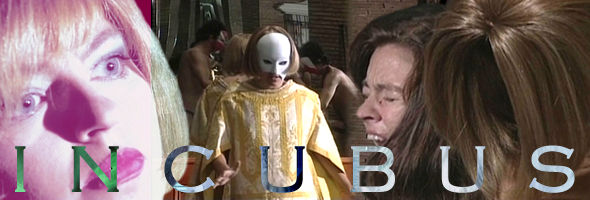
Color, 2002, 78m. / Directed by Jess Franco / Starring Carina Palmer, Carsten Frank / Sub Rosa (US R1 NTSC) / DD2.0
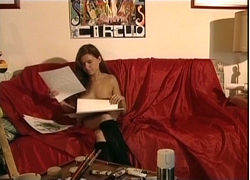 recorded and goes downhill from there. The story, for lack of a better term, concerns successful, folically-challenged artist Johan (Frank), whose riches can be attributed to a pact made with the sexy, supernatural Lorna (Fata Morgana), an incubus (err, technically succubus, but whatever...) who gives him fame and fortune in exchange for his daughter when she turns twenty. Coincidentally, said daughter, Lucy (Palmer), returns home and spends her time lolling around naked in bed, reading the Marquis De Sade, and indulging in S&M fantasies. Meanwhile Johan's usually naked wife (Lina Romay) doesn't take too kindly to Lorna's influence on their lives, and when the time comes to pay the devil his due, no one emerges unscathed.
recorded and goes downhill from there. The story, for lack of a better term, concerns successful, folically-challenged artist Johan (Frank), whose riches can be attributed to a pact made with the sexy, supernatural Lorna (Fata Morgana), an incubus (err, technically succubus, but whatever...) who gives him fame and fortune in exchange for his daughter when she turns twenty. Coincidentally, said daughter, Lucy (Palmer), returns home and spends her time lolling around naked in bed, reading the Marquis De Sade, and indulging in S&M fantasies. Meanwhile Johan's usually naked wife (Lina Romay) doesn't take too kindly to Lorna's influence on their lives, and when the time comes to pay the devil his due, no one emerges unscathed.
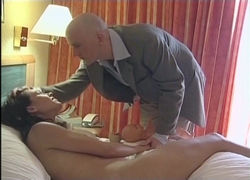 fans know, the director tends to repeat characters and situations from his earlier films to an obsessive degree. For example, Dr. Orloff has been through innumerable permutations for over four decades, and here Franco revisits the "character" of Lorna, present in 1967's Succubus and used again in 1974's Lorna the Exorcist (Les possédées du diable), of which Incubus is more or less a remake (but minus the crab critters emerging from Romay's nether regions). Though shot on video, this is a bit more visually polished than Franco's other contemporary work; some of his trompe l'oeil bits involving mirrors are surprisingly well-designed, and apart from the absurd credits, he avoids those tacky digital effects that plagued some of his other video projects. Outside of his hardcore work, this is one of the most nudity-heavy titles in the Franco canon; virtually every scene is filled with nude bodies, both female and male, strolling or writhing in front of the camera. As usual Ms. Romay is the most unabashed of the bunch, which may only appeal to a very select audience. By far the most memorable aspect of the film is its finale, an extended dream-like demon orgy in which a lavish room (by all appearances a hotel lobby) turns into an erotic playground, with
fans know, the director tends to repeat characters and situations from his earlier films to an obsessive degree. For example, Dr. Orloff has been through innumerable permutations for over four decades, and here Franco revisits the "character" of Lorna, present in 1967's Succubus and used again in 1974's Lorna the Exorcist (Les possédées du diable), of which Incubus is more or less a remake (but minus the crab critters emerging from Romay's nether regions). Though shot on video, this is a bit more visually polished than Franco's other contemporary work; some of his trompe l'oeil bits involving mirrors are surprisingly well-designed, and apart from the absurd credits, he avoids those tacky digital effects that plagued some of his other video projects. Outside of his hardcore work, this is one of the most nudity-heavy titles in the Franco canon; virtually every scene is filled with nude bodies, both female and male, strolling or writhing in front of the camera. As usual Ms. Romay is the most unabashed of the bunch, which may only appeal to a very select audience. By far the most memorable aspect of the film is its finale, an extended dream-like demon orgy in which a lavish room (by all appearances a hotel lobby) turns into an erotic playground, with 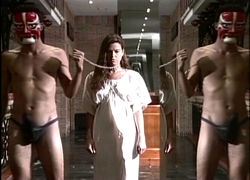 a damned, victimized Lucy led on a chain collar by men bearing some very mean strap-ons. And once again Franco recycles Daniel White's music for Female Vampire, though the use here is fairly appropriate.
a damned, victimized Lucy led on a chain collar by men bearing some very mean strap-ons. And once again Franco recycles Daniel White's music for Female Vampire, though the use here is fairly appropriate.
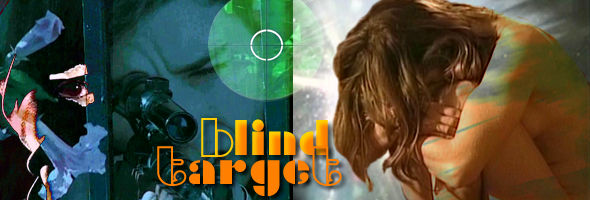
Color, 2000, 89m. / Directed by Jess Franco / Starring Rachel Sheppard, Oliver Denis / Sub Rosa/Ventura (US R1 NTSC)
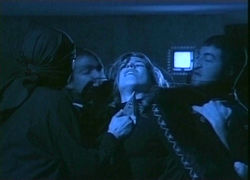 His closest attempt to a legit action film, Blind Target, is one of his later period shot-on-video projects and, despite a slow and disorienting first act, offers a few wild moments to appease his fans while keeping unsuspecting babes 'n' bullets fans utterly baffled.
His closest attempt to a legit action film, Blind Target, is one of his later period shot-on-video projects and, despite a slow and disorienting first act, offers a few wild moments to appease his fans while keeping unsuspecting babes 'n' bullets fans utterly baffled.
As part of a publicity tour, successful writer Maria Baltran (Vampire Blues' Rachel Sheppard) returns to the South American country of San Hermoso from which she fled as a young girl. Her latest work is a scathing indictment of the corrupt politics in her homeland, and no sooner does she arrive than mysterious threats are delivered at knifepoint from a gang of black-hooded secret police (whose female leader bears a very familiar, thick Spanish accent). Of course, that doesn't stop Maria from enjoying some lesbian lovin' in her hotel room with her best friend, Beatriz (Tatiana Cohen), who's promptly kidnapped for her trouble. In a hotel bar Maria runs into two very different scream queens, Tora (Lina Romay) and TV personality Serena (Linnea Quigley); unfortunately it's not long before our heroine winds up bound naked to a table, getting poked and prodded by Tora before being blackmailed into assassinating an enemy of the San Hermoso dictator. Yep, with a rifle now forced into Maria's hands, Franco turns this into a kinky copy of La Femme Nikita! Can the plucky novelist find a way out of committing cold-blooded murder? Will resourceful, kickboxing CIA agent Greg (Oliver Dennis) find her in time? Will Lina ever give a 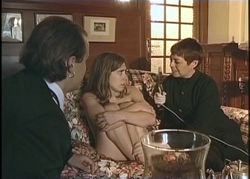 believable line reading? Watch and find out!
believable line reading? Watch and find out!
As with most of Franco's other "commercial" projects like Faceless and Count Dracula, this is one odd mongrel of a movie. While Franco peppers the beginning with a gratuitous towel-draped girl-on-girl encounter and some mild bloodshed, his trademark mania doesn't really kick in until the always reliable Lina shows her stuff during the torture and blackmail sequences. From that point Blind Target is low rent, guilty fun, with a thoroughly ludicrous climax packed with awkward gunfire and flying feet. The hyperactive digital editing effects which cluttered some of his other recent work are thankfully kept in check here, but the sound editing is still touch and go at best; Sheppard's disorienting delivery in particular ranges from her almost indecipherable on-set voice to dubbed dialogue seemingly recorded by two different performers. Perhaps it's Franco's Bunuelian ploy to underscore the duality of Maria's personality... or maybe not. 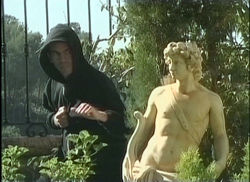
As with other Franco video features, Blind Target looks good overall but is wholly dependent on the erratic nature of the format, which can look grainy or muddy at times. Daylight scenes are consistently clear; however, note that there isn't digital artifacting during those driving scenes-- it's just dust on the camera lens. As usual Sub Rosa and One Shot have thrown in a bounty of extra goodies, including a clip from the dubbed Spanish version (Linnea's scene only), a "making of" featurette showing Franco at work, excised footage with commentary by producer Kevin Collins, a still gallery, and a batch of Franco's Sub Rosa trailers.
![]()